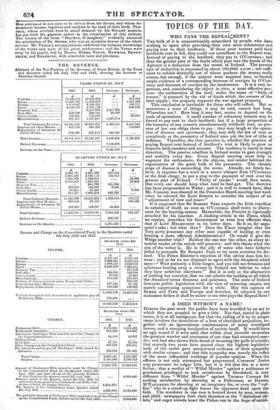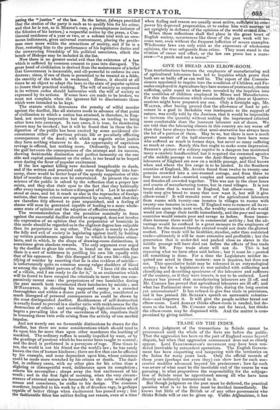A DEED WITHOUT A NAME!
Duanza the past week the public have been horrified by an act to which they are puzzled to give a title. Not that, stated in plain terms, it is at all ambiguous, but that the calling of it by its proper name involves the demolition of a host of cherished prejudices, together with an ignominious condemnation of many worshiped heroes, and a sweeping inculpation of society itself. It would have an ugly sound if it were said, that within even juvenile memories the greatest warrior and statesman of our time had attempted murder, and had also shown little dread of incurring the guilt of suicide; that scarcely two years have passed since the highest legislative body of the realm gave unequivocal evidence of their sympathy with similar crimes ; and that this sympathy was merely the reflex of the more influential workings of popular opinion. When the offence is not only attempted but perpetrated, Coroners' Juries may pronounce its vulgar title, but it is felt that this is a mere fiction ; that a verdict of" Wilful Murder" against a nobleman or gentleman privileged to seek satisfaction by bloodshed, is very different from "Wilful Murder" against THOMAS COOPER for seeking satisfaction by shooting at a Policeman, or DANIEL M`NAUGHTEN for shooting at an imaginary foe, or even the " ruffian" who in a stand-up fight leaves his opponent dead upon the field. The murderer in one case is hunted down by man, woman, and child : newspapers hurl their thunders at the "diabolical villain," and eager crowds beset the Police-van in the hope of antici
fisting the "justice" of the law. In the latter, (always provided that the station of the party is such as to qualify him for his crime, and that he is not, as in MIRFIN'S case, a presumptuous imitator of the felonies of his betters,) a respectful notice by the press, a Continental residence of a year or two, or a solemn trial with an erroneous indictment, 4ives universal contentment, placing the gentleman once more within the attractions of society, and if he is a Peer, restoring him to the performance of his legislative duties and the unwavering friendship of his political associates, albeit the bench of Bishops may be included in the list.
Now there is no greater social evil than the existence of a law which is suffered by common consent to pass into disregard. The great bond of civilization is derived from the maintenance of a belief that Government is inexorable, and all-powerful to enforce its own decrees ; since, if one of them is permitted to be treated as a fable, the sanctity of the whole is weakened. Hence, it should at all times be an object to adapt the laws to the state of popular opinion to insure their practical working. The will of society as expressed in its written codes should harmonize with the will of society as expressed by its actions. If some laws are made to be broken, we must not complain when the ignorant fail to discriminate those which were intended to be kept.
The statute which denounces the penalty of wilful murder against the duellist, like all statutes made in advance of that point of civilization to which a nation has attained, is therefore, in England, not merely inoperative but dangerous, as tending to bring other laws into contempt. In rare cases, it is true, its slumbering terrors may be invoked ; but it will be found that in these the indignation of the public has been excited by some accidental circumstances either of previous private life or peculiarly afflicting consequences of the deed ; with which as regards strict justice they have nothing whatever to do. An opportunity of capricious revenge is offered, but nothing more. Ordinarily, in fatal cases, the gulf between the consequences of the attempt and its success, showing fashionable distinction and perfect immunity on the one side and capital punishment on the other, is too broad to be leaped even during the fever of popular excitement. If the law against killing were declared inapplicable to duels, and if the written and practical code were thus brought into harmony, there would be better hope of the speedy suppression of this kind of murder than can now be entertained. At present the conscience of the public is salved by the reflection that a proper law exists, and they shut their eyes to the fact that they habitually offer every temptation to induce a disregard of it. Let it be understood at once, and let it reach us also in the reproaches of foreign nations, that these crimes are engendered by society, and that they are therefore fitly allowed to pass unpunished, and a feeling of shame will soon be generated capable of leading to a more wholesome state of opinion and the adoption of effective remedies. The recommendation that the penalties nominally in force against the successful duelist should be expunged, does not involve the expression of an opinion that the perpetrator of homicide in this mode should be regarded as in the slightest degree less culpable than its perpetrator in any other. The object is merely to show the folly and evil of society in legislating against itself, by holding up written punishments against that to which it furnishes stimulants, and to which, in the shape of drawing-room distinctions, it sometimes gives absolute rewards. The only argument ever urged by the duellist to gloze his crime, is based on the assertion that there is a sort of nobleness in perilling his own life equally with that of his opponent. But this disregard of his own life—this justifying of murder by asserting that he is also reckless of suicide— is unfortunately quite as common among vulgar shedders of blood as among the qualified patrons of the duel. " I have rid the world of a villain, and I am ready to die for it," is an exclamation which will be found to have escaped the criminals in more than one comparatively recent case : the perpetrators of two homicides during the past month both terminated their butcheries by suicide ; and WNAUGHTEN, in shooting his supposed enemy in a crowded thoroughfare and within a dozen yards of the police, manifested as much disregard of personal consequences as could be shown by the most distinguished duellist. Recklessness of self-destruction is usually found to prevail in a similar ratio with recklessness for the destruction of others : and accordingly, the high civilization which begets a prevailing idea of the sacredness of life, manifests itself in lessening these twin evils arising from the activity of one morbid impulse.
And not merely can no favourable distinctions be drawn for the duellist, but there are some considerations which should tend to fix upon him far more than upon other murderers the loathing of mankind. The ordinary ruffian is usually impelled by want, or by the goadings of passions which he has never been taught to control ; and the deed is performed in a paroxysm of rage. Nine times in ten, the world is not his friend nor the world's law ; he has rarely known the ties of human kindness ; there are few that can be affected by his example, and none dependant upon him, whose existence could be made more wretched by his crimes or death. The duellist, in ordinary cases, with no other plea for his crime than a slighting or disrespectful word, deliberates upon its completion ; selects his accomplice ; sleeps away the first excitement of his wrath ; and in the first light of morning, when the very circumstances of external nature are favourable to the calm workings of reason and conscience, he stalks to his design. The common murderer, impelled to his work by a fit of drunken rage, is lizerhaps capable of better things when excitement has passed away ; but the fashionable felon has neither feeling nor reason, even at a time when feeling and reason are usually most active, suffi power his depraved propensities, or to endue him with act uprightly in defiance of the opinions of the world aroblisl When these reflections shall find place in the great heart of English society, occurrences like those of the past week will become rare, even without the frequent infliction of severe examples. Wholesome laws can only exist as the exponents of wholesome opinions, the true safeguards from crime. They must stand in the relation of cause and effect, or the law can prove but a scarecrow—K a perch and not a terror."



























 Previous page
Previous page